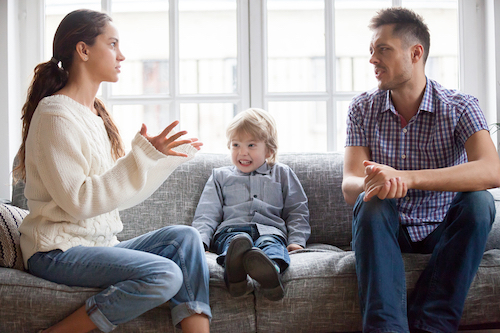 It’s a scenario familiar to many parents. An argument, a tense situation, an emotional reaction. It happens occasionally… but “not in front of the kids”.
It’s a scenario familiar to many parents. An argument, a tense situation, an emotional reaction. It happens occasionally… but “not in front of the kids”.
Many parents have found themselves shielding their children from arguments or anything negative, in the hopes of protecting their children from getting upset.
But recent research shows it’s actually better to show negative emotions in front of children (as long as it’s in a healthy way), rather than try and hide them.
“Many studies now show that children, even very young children, are very sensitive to their parents' emotions so if parents are upset or in conflict the child may already have some sense that something is wrong even if parents are trying to hide it from their children,” Sara Waters, study author and assistant professor in the Department of Human Development at Washington State University told Theravive.
“Parents are also very important role models for their children in terms of learning which emotions can be expressed and how to manage or regulate strong emotions. When parents try to hide or suppress their emotions, they are teaching their children that those emotions are not "ok" or safe to feel and express,” she said.
Waters and her colleagues studied 109 parents and their children in San Francisco. In conducting their research the investigators gave the parent a stressful task of public speaking and receiving negative feedback from an audience. They then gave the parents an activity to complete alongside their children: some parents in the study were told to suppress their emotions and others were told to act normally.
The task to be completed with parent and child was to assemble a lego design. The children were given the paper instructions but were not allowed to touch the lego. The parents meanwhile had to put together the lego project without looking at the paper instructions. The parents and children were filmed when completing the task and Waters and a team watched the videos to mark signs of warmth and guidance, as well as other notable emotions.
Whilst undertaking the task, both parent and child were hooked up to sensors that measured heart rate and stress levels.
The researchers found that parents who tried to hide their stress from their children during the task were less positive partners for the children and offered less guidance. The children of parents who supressed their emotions were also less positive and less responsive to their parents.
“We found that when parents suppressed their emotion while interacting with children, the quality of that interaction decreased and that both parents' and children's positive mood decreased as well,” Waters said.
The researchers also found that children were likely to be more sensitive to emotional suppression from a mother than a father.
“We also found that fathers who suppressed had decreases in their warmth and responsiveness toward their children while mothers who suppressed did not. And children who interacted with a suppressing mother had decreases in warmth toward their mother, but children of suppressing fathers did not,” she said.
Waters notes that previous studies have suggested men are more likely to suppress their emotions, so to children this may not seem unusual and didn’t have as great an impact when compared with a mother emotionally suppressing.
Waters says children are good at picking up emotional cues from their parents, and if they feel something negative has occurred and their parents don’t address it, this confuses them.
She says that rather than suppressing negative emotions, parents should share them in a healthy way.
“Hiding or denying our emotions tend to make them more destructive. It is healthier to let ourselves feel our emotions without judgement and then find safe, constructive ways to manage them. When a parent acknowledges to their child that they are upset and then helps the child understand the constructive things that the parent is doing to manage those emotions, the child has gotten a powerful lesson regarding anger and what to do about it,” she said.
But Waters says the research doesn’t mean everything is appropriate in front of the kids.
“I want to be clear that the message is not ‘go ahead and fight in front of your kids all the time or tell your kids all your stresses and problems’. Instead, the message is by acknowledging your feelings and using constructive ways to manage those feelings, you are helping your child learn to be resilient to upsetting things they will face in their life by seeing you be resilient,” she said.
Elizabeth Pratt is a medical journalist and producer. Her work has appeared on Healthline, The Huffington Post, Fox News, The Australian Broadcasting Corporation, The Sydney Morning Herald, News.com.au, Escape, The Cusp and Skyscanner. You can read more of her articles here. Or learn more about Elizabeth and contact her via her LinkedIn and Twitter profiles.